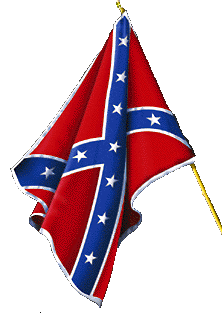
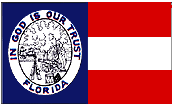
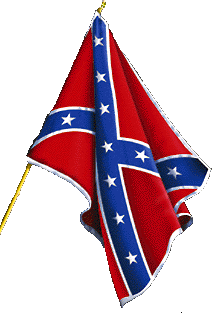



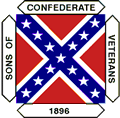

Pvt. William Riley Milton Camp 741
Sons of Confederate Veterans

Volume 10 Commander Terry Binkley Issue 11

![]()
Commander's Corner
Greetings Compatriots,
Our next camp meeting will be held at O’Brian’s Restaurant in Leesburg on Tuesday, December 6th. I wanted to move the meeting night back to Tuesday so it wouldn’t interfere with those who attend church services on Wednesday night. The address is 1690 Citrus Blvd., phone number (352) 787-7188. It is located on 441(Citrus Blvd.), just south of the Golden Corral and near the Tractor Supply store. Many of you had expressed a desire to find a different meeting place that would be a little more wallet-friendly. They have sandwiches and appetizers in the 4 and 5 dollar range. We will try O’Brian’s and maybe it will work out that we can remain there for a while.
Several compatriots and wives turned out at the Ocklawaha River Raid re-enactment for recruiting duty. Thanks to 8th Brigade Cmdr. Harry Hurst and wife, Karen, Lt. Cmdr. Jim Binkley Jr. and wife, Hope, 2nd Lt. Cmdr. Jim Binkley Sr. and wife, Nell, Adjutant Bill McClelland, Benevolence Officer Paul Mott and wife, Sandy, Sharon Hurst, (wife of Sgt. at Arms, Eddie Hurst) and her daughter and granddaughter, Shannon and Savannah. We set up the trailer and decorated it and set out a table with SCV material. Compatriots Jim Baumgardner and Erik Field were also present, Jim was participating in the re-enactment, and Erik was next to us with his Scout troop selling rib dinners to raise money for the Scouts. Thanks to you all for your dedication and commitment to the Cause!
The next activity we have coming up is the Cracker Christmas Parade in Umatilla on November 26th, please plan to attend this growing event and show your “Rebel Pride”.
We need to get to the staging area across from Golden Gem around 8:30am to gussy up the trailer and be prepared to move out by 10am.
At the November meeting, the Nominating Committee submitted the slate of nominees for camp officers and the camp voted to accept the nominations. The camp also voted to amend our officer corps to include as elected officers; Assistant Chaplain, Benevolence Officer, and Sergeant At Arms. All of the officers currently serving have been nominated to continue serving in their current capacities. Elections will be held at the December meeting with installation at the Lee-Jackson Banquet on January 21st. I encourage everyone to attend the camp meetings and functions. I want everyone to be an active member of this camp. We need and welcome your ideas and input and we sure could use your “elbow grease” on projects and parades and such. I cannot stress enough that this is “our” camp, not “my” camp! To paraphrase President Kennedy, “Ask not what your camp can do for you, ask what you can do for your camp.”
Y.O.S.
Terry
If I ever disown, repudiate or apologise for the cause for which Lee fought and Jackson died, let the lightnings from Heaven rend me and the scorn of all good men and true women be my portion. Sun, moon and stars all fall on me when I cease to love the Confederacy. 'Tis the cause, not the fate of the cause, that is glorious"-- Major R. E. Wilson, C.S.A.
![]()
Chaplain’s Chat
CHRISTIAN UNIFORMS
Their clerical collars identified then as "men of the cloth", but there were no identifying insignias to designate their particular denomination. The ladies who sat next to them as well as the wedding bands they wore was pretty good evidence that they were not a couple of the Pope's "unwed fathers". That seemed to narrow the choices down to Anglican or Lutheran though I've seen other denominations who wore such garb.
Across the restaurant were a couple of tables of men and women of the law. All wore uniforms of their particular department of service. Though they had no insignias, the combat boots wide belts with handguns, handcuffs, big flashlights and whatever else cops carry in those little leather pouches that hang all the way around their waist gave them away their profession and hinted at SWAT team.
I wonder why the clerical garb of any of the denominations I'm familiar with do not have an identifying patch on their sleeve or an insignia on their shirt? His uniform easily identifies a deputy sheriff. You will never doubt that a the man or woman with that white jumper and trousers, black scarf and highly polished black shoes and flat hat are proud sailors in our Navy. A US Marine is easily distinguishable from an Air Force flyboy. And both will display their rank on sleeve, collar or shoulder board. And enlisted men may even display the stripes on his arm to testify to the number of years he has served.
Uniforms and other identifying insignia are important as a means of recognition.. And whether you've worn the uniform of a military personnel or been one of those who have stood in appreciation and admiration when our fellow citizens came parading down Main Street, returning from faithful service in Iraq, you can appreciate a uniform. Dare I confess that one of the greatest motivations this now overgrown kid had for joining the Cub Scouts way-back-when was the privilege of wearing that beautiful blue shirt with the bright yellow scarf? And becoming the proud owner of that costume, I could hardly wait until Thursday when I could wear it to school in preparation for the Pack meeting that afternoon.
"I Love A Parade" the song writer declared. And I have a sneaking suspicion that we males of the species have a reluctantly admitted love affair with uniforms. Why do you see so many authentic team caps on baldheads of men too old to play baseball? A Dale Earnhart T-shirt stretched over a bulging belly or a "Red Wings" hockey jersey 2 sizes too big on a 7-year-old boy?
And since it shows up in us at such a young age I can't help but wonder at what early age it began. I mean, "age" as in the church age. Did the Disciples come to Jesus with the suggestion that He issue special uniforms to those who "made the team"? He did not do it.
But He did give a way to recognize His disciples. He said in John 13:35 “By this shall all men know that ye are my disciples, if ye have love one to another.” Someone coined this little couplet:
Living above with saints we love – oh! That will be glory.
But living below with saints we know – now that’s a different story!
It may be a different and even difficult story. But it is the Christian way. The Christian’s “uniform”. And when I stand inspection for our Commander, I wonder how well my uniform conforms to His standard?
Dun
![]()
Confederate Veteran
In Camp Douglas Prison In 1865
By J.S. Rosamond, Durant, Miss., Co. G, 4th Miss. Regt.
I was captured in December, 1864, at the last battle of Nashville, Tenn., and was sent with other prisoners to Camp Douglas Prison, the coldest place I was ever at. We arrived in Chicago about two o’clock in the morning, and were hustled out of cold boxcars into snow about a foot deep. Being already almost frozen, that nearly finished us. I had on a coat, but no vest, a thin cotton shirt without undershirt, and a thin blanket. Well, it was four miles out to prison along the banks of Lake Michigan, and we got the full benefit of that lake wind. We got to the prison about daybreak, and some of us had to stand out in the snow all that day. We were passed into the prison as our names were called by two men. Every prisoner was searched to see if he had anything on him that he could do any harm with. My name beginning with R, I got into prison about sundown.
I saw old men cry that day like children, they were so cold. I was very small, only twenty years old, yet full of life; so I ran and jumped up and down in the space allowed us (about 50 yards), and in that way I kept up circulation, but my feet were frozen. When they turned me into prison, a guard took me to my barrack, which was about one hundred feet long. There was a red hot stove in each end, and men were so thick around them that I couldn’t get near; so I gave it up and climbed to a top bunk, pulled off my shoes, and wrapped my feet in my blanket. I did very well, it being warm up there; but every man that got to the red-hot stoves had to have his big toes cut off. They thawed too quick; so I saved my toes by wrapping them up in the blanket.
In March it began to moderate, so we could get out of doors a little. To every barrack was a cookroom, and no one but the cook was allowed in there. At the back door of each cookroom an empty barrel was kept for the bones and slops, which would be carried out of prison by scavenger wagons. Our daily ration for breakfast, which was about nine o’clock, was a third of a loaf of baker’s bread and a piece of fat pickled pork just one inch square. Dinner, at three o’clock, was the same, only it was cooked and stirred up together. Each man drew a gill of the “soup”, and it was all we got each day for seven months.
They would punish men in different ways, one of which was, if they caught a man getting any bones out of those barrels, to make him put the bone down on the ground and then get down on his all fours and walk around the bone and growl like a dog, making him stop occasionally and bark, and so on for a half hour or more, and then make him get down in the dirt and gnaw at the bone and growl like a dog when another dog is near. Another form of punishment was to make the prisoner sit astride a wooden “horse” for an hour or so. These carpenter’s horses were made sharp on top purposely; so it didn’t take long for a fellow to get tired and to hurt. One day they had two men on the horse, and just for mischief one of them began kicking and asked the guard to give him a pair of spurs. There happened to be an old stove lying near by, the top and bottom of which were tied to his feet, and he was told: “Now, d---n you, kick and spur.” It was not long till he was begging for those weights to be taken off. He finally began to cry like a child, and begged most piteously for them to be taken off before they would do so. That Rebel couldn’t walk for about ten days afterwards. If he is still alive, I would like for him to write about Camp Douglas for the VETERAN.
I was hungry from the time I entered that prison until turned out, on the 8th of May, 1865, by taking the oath to the United States. I have that oath yet, and will keep it as long as I live. The guards of that prison were as mean to us prisoners as the devil could make them. They had never been to the front; else we might have been treated as human beings. A soldier who had seen service at the front would treat a prisoner as he would a brother, his sympathy going out to a man captured in battle. I have guarded prisoners captured in battle, and treated them with as much respect and kindness as I did my own men.
I was at Camp Douglas when that Rebel climbed the flag pole, one hundred and eighty feet high, and put the rope in the pulley. The pole was so small toward the top that he would vibrate two or three feet. I looked at him all the time.
My bunk mate at Camp Douglas was a man from Florida by the name of Pine. If he is still alive, I would like to hear from him. It was the rule at Camp Douglas for every light to be put out when the cannon was fired at nine o’clock. One night the men above my bunk commenced talking, and would not stop when requested to by Comrade Pine. The first thing we knew, two Yankees were pounding on the bunk above us with their billets, and they made the four men come down, then made Mr. Pine come out, and reached back for me; but I was very small and crouched back as far as I could get, so they missed finding me. They took the five men out and made them stand perfectly stiff at the knee and bend over and put the tip end of their four fingers to the ground, and kept them in that position for a half hour, which is hard to do and is a very severe punishment, more especially for an innocent man who was doing all he could to stop the talking. I know Pine was the maddest man I ever saw when he came back to bed, and he told those fellows that if they ever talked any more after the cannon fired he would get up and bring the guard and point them out to him. They didn’t talk any more while I was there. I left in about two weeks after that.
One good thing the Yankees did for us was to give us plenty of coal to burn; but the grub was very scant, and some days they would cut off the water and make us go for a whole day without any to drink, which was very cruel, for we had to keep tanked up on water to keep alive.
There was a dead line about ten feet from the wall, and it was a death penalty to step over that line. One day a prisoner’s hat blew over the dead line, and to get it he had to put one foot over, and the guard shot him, from which he died afterwards. If there are any of those Yankees alive who guarded Camp Douglas in 1865, if I were in their shoes, I would not tell that I was one of them.
(From August 1908 CONFEDERATE VETERAN)
![]()
"Remembrance Book"
This month’s ancestor is Elon God Blackmer the ancestor of Compatriot Bob Blackmer. Elon was born in the late 1830’s and was raised in Wheatland, Monroe County, in northwest New York. According to the U. S. Census of 1860 he still resided in Wheatland. At a later time, he traveled to Rowan County, North Carolina, probably following his half cousin, Luke Blackmer. Luke Blackmer was a promising attorney who had been living in Rowan County since about 1850. It is possible that, with the winds of war coming, Elon knew his heart was with the Cause of the South and decided to relocate to lend himself to that cause. Shortly after moving to North Carolina, on May 16, 1861, Elon God Blackmer, at the age of 22, enlisted in Company F, of the 7th North Carolina Infantry Regiment, and was commissioned a 2nd Lieutenant. He would later be commissioned a 1st Lieutenant. His regiment would participate in many battles including, New Bern, Fort Macon, Hanover Courthouse, Richmond 1862, Gaines Mill, and Frasier’s Farm. It was here, on the third day of battle at Frasier’s Farm, that Lt. Blackmer was wounded and lost an eye. This wound may have caused him to require time for rehabilitation or he may have continued to fight. If he had continued to fight, he would have been involved in the Battles of Harrison’s Farm, Malvern Hill, 2nd Manassas, Fredericksburg, Harper’s Ferry and Sharpsburg. However, he resigned from the 7th N.C. Infantry and joined Company G, of the 66th North Carolina Infantry Regiment as a Captain and the Company Commander.
The 66th Inf. Regt. Was organized in November, 1862 at Kingston, N.C. by consolidating the 8th Partisan Rangers and the 13th Infantry Battalion. Its men were from the counties of Orange, Nash, Franklin, Wayne, Lenoir, Carteret, Jones, Duplin, and New Hanover. The unit was attached to General J. G. Martin’s and Kirkland’s Brigade. The 66th Infantry Regiment had many engagements, including Newport Barracks, Cold Harbor, the Petersburg Siege, Burgess’ Mill, 1st and 2nd Fort Fisher and Bentonville.
On April 20, 1865, the 66th North Carolina Infantry Regiment surrendered at Durham Station, Orange County, North Carolina.
After the war, Captain Blackmer became a farmer in Rowan County, N.C. His honorable life came to an end at the early age of about 30. According to bible records, Elon God Blackmer died on September 21, 1865, in Morganton, North Carolina, possibly due to wounds sustained during his support of the valiant Cause of the South.
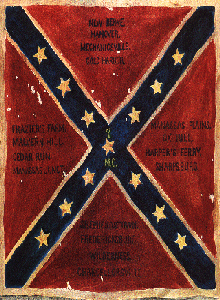
7th North Carolina Infantry
![]()
Our Camp
History/News/Notes
NEWS:
Next Event:
Cracker Christmas Parade, Umatilla, FL. Meet across from Golden Gem citrus plant on SR 19 at 8:30 a.m.
Next Meeting: First TUESDAY, Dec. 6th, at O'Brian's Restaurant in Leesburg, FL.! Located at 1690 Citrus Blvd. (441) in Leesburg, south of the Golden Corral where our meetings used to be held, and near the Tractor Supply Store. 6 P.M. Supper, 7 P.M. Call to Order. Guests are always welcome!
